In my U.S. history classes in high school, I barely remember reading anything about the Black Panthers— albeit it was more than four years ago now, but I still remember getting the general impression that the Black Panther group held “evil” intentions and actions, due to my high school’s lack of true education on the subject. I think that that was because our history textbooks focused on the group’s militancy far more than their root cause. On the other hand, Agnes Varda’s 1968 documentary titled Black Panthers openly and honestly captured the group’s members and what they stood for within a brief twenty-eight-minutes. Perhaps my distorted memory of what the Black Panther party represented came from my lack of understanding tied with my believing whatever was written – or not written – in my school’s textbooks, but now, I have a better understanding of what they represented and fought for. I now know that they were only standing up for what was right. After viewing this documentary and seeing all that I was not taught in high school, particularly about the Black Panthers and Black history, I’m hopeful that one day, U.S. history textbooks will be re-written to tell the whole truth.
Since Varda was a Left-Bank director, non-fiction filmmaking was not out of the question to fulfill her creative lust. When she went to California to record Black Panthers, she also filmed Uncle Yanco (1968) and Mur Murs (1981), both of which are also documentaries. The former focused on Varda’s family history as she located a relative she had never met before, and the latter focused on beautiful murals and their connection to the community around Los Angeles. Clearly, her flexibility to film anything from her own history, to examining art, to something as controversial as the Black Panther party, shows exactly why she was such an inspiration – and don’t even get me started on her fantastic fictional films.
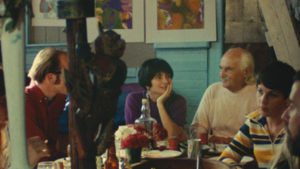
Agnès Varda and her uncle Jean Varda from her documentary, Uncle Yanco.
Besides her adaptability, some of her other great attributes as a filmmaker were her curiosity and desire for a deeper awareness of how the world worked around her. Certainly, in her case, curiosity did not kill the cat. She made her documentaries to enhance her audience’s understanding of specific issues, but also made them for her own understanding. Varda directed other documentaries like Salut Les Cubins (1963) as well as a collaboration with other exceptional French New Wave directors called Far From Vietnam (1967), both projects focusing on pressing political issues. Similar to her Left-Bank colleague Chris Marker and his film La Jeteé, her film Salut Les Cubins was made entirely out of photographs from her visit to Cuba post-revolution. Yet, the film only used about forty percent of the photos she took. Far From Vietnam focused on the imperialism in Vietnam and was an empathetic gesture in protest for those who were part of the war. By making films like those that imposed new concepts, cultures, opinions, and perspectives, she continually gained a new outlook that she intertwined into her lifestyle and into her wonderful films.
Filming Black Panthers had proven to be no different, and in fact, was made for more than just to further inform the public about the group and their cause, as it also contained a very feminist mindset. An overarching philosophy that the Black Panthers believed in was that the rules and theories about oppression towards the Black community needed to change —and was going to change through them. Varda thought about all of the men involved in the group that created that philosophy, but what about the women? What role did the women have in the movement, and additionally, what about feminist-friendly men? She answered those questions through interviewing several women during a rally about freeing Huey Newton, the group’s —at the time— leader. Varda asked them about their natural hair, clothing, and what their duties were compared to the men. In the film, some of the women and men wore traditional dress and styled their hair naturally. A few women who were asked why they “wear their hair like that”, said they felt like wearing their hair naturally represented the idea that their natural appearances should be normalized, and their hair— although considered not up-to-par with the beauty standards in the late 1960’s— was part of who they were.
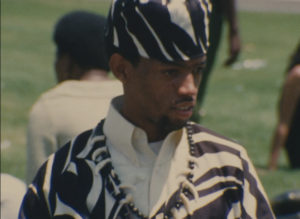
An unnamed man wearing traditional African dress.
In an interview with Kathleen Cleaver, who worked as the communications secretary for the party —which meant she handled how information about the party was conveyed whether it was, posters, newspapers, or word of mouth— said that for many years Black women were told that only white women were beautiful, and that even Black men would think white women were more attractive. But Cleaver also mentioned that Black women were more aware and prouder of their natural appearance, most likely in connection to the group’s rising influence. She even asked some of the male front runners in the group about it, and they said a woman’s place was equal to theirs. Varda reflected on the film’s feminism after the release and said, “A lot of men had been thinking for us. Marx did. Engels did. These people did beautifully. Yet, maybe we need to get through Marx, for Marx doesn’t give the keys and answers for us women… If men want to join, leave the door open. They can listen”. Indeed, the Black Panther party philosophy did not use gender as a discriminatory factor, for it was them as one against their oppressors.
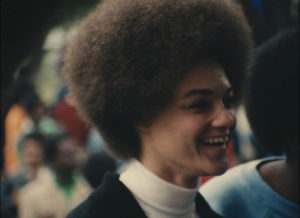
Kathleen Cleaver laughing during her interview.
Truthfully, I shed a few tears watching this, although it was not a pessimistic film. The documentary made me incredibly sad, seeing that many of the same things they were fighting for, we are still fighting for today, fifty-two years later. For instance, in the film they chant ‘Free Huey!” over and over, but the two words meant more than just freeing their imprisoned brother; they also constituted a togetherness and the bigger picture of receiving personal, political, and social freedom for every member of the Black community. I instantly thought of the more recent phrase, “I can’t breathe” and how it represents everything that “Free Huey” did, and maybe even more, now. In rather recent events with the passing of George Floyd and following riots, it really shows how jaded many of us have become with the injustices made against the Black community.
Much like the Black Panther Party, a more modern group surrounded around the phrase “Black Lives Matter” was created to vocalize the stigma and hardships around Black issues and Black people. While the Black Lives Matter (BLM) movement has relatively remained similar to the Black Panther party in terms of goals and motivations, the name had to be changed, but not because the name had already been previously used; the Black Panther party name will always have significant cultural meaning in history. It is because we have come to a point, as a society, where the change that needs to happen has become so overlooked and overdue that we must bluntly say, “Black Lives Matter.”
When the BLM movement recently sparked again, there was some controversy with those who disagreed with what the movement believed in, and “All Lives Matter” became a counter phrase. Not all of those who used the saying used it out of spite. Some have simply looked passed the disparaging context and used it to say, no matter who we are or what we look like, we are all human beings and should be treated as such. Yet, with the immense divide in our country growing over the last few years, 2020 has particularly tipped the scales and made racial disparities in the U.S. glaringly obvious. The building tension between both sides in the U.S. finally boiled over when George Floyd passed away. The saying, “All Lives Matter” lost most of the seemingly innocent context many tied to it, and it became used as hate speech towards the BLM movement.
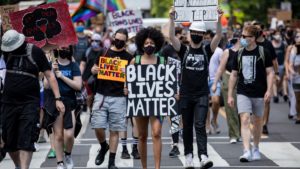
Protesters at a Black Lives Matter rally.
I cannot dictate the exact reasons why those who believe in saying, “All Lives Matter”, use the phrase, but nonetheless, I would like you to look back in U.S. history and think about all of the injustices done to Black people or any person of color. Still, I am learning about the right terminology, perspectives, and trying to develop my own awareness about political issues and topics such as Black Lives Matter. This video presents an understanding perspective between a Black man and a group of police officers, which I found very informative and non-aggressive, from either side.
Even though Varda passed on March 29, 2019 at ninety years old, I wonder what she would say knowing that she filmed something on nearly the exact same subject, decades ago. I wonder if she would think society had progressed at all. Maybe, she would make another open and honest documentary that future generations would view, and hopefully be able to say, “Wow, look at how far we’ve come.” With her feminist education and knowledge about how to respectfully portray a radical, complex political issue, Varda has once again blown my mind, even though the film was just shy of half an hour long. Her impact on the French New Wave will not be forgotten and surely her films will continue to be an enlightenment to others, like they have been for me. I have learned through her films and legacy that sometimes it’s not about trying to create the reality you want to live in, but realizing and becoming more aware of the reality you currently exist in; understanding that you can fight for an honest, positive change, right here, right now.

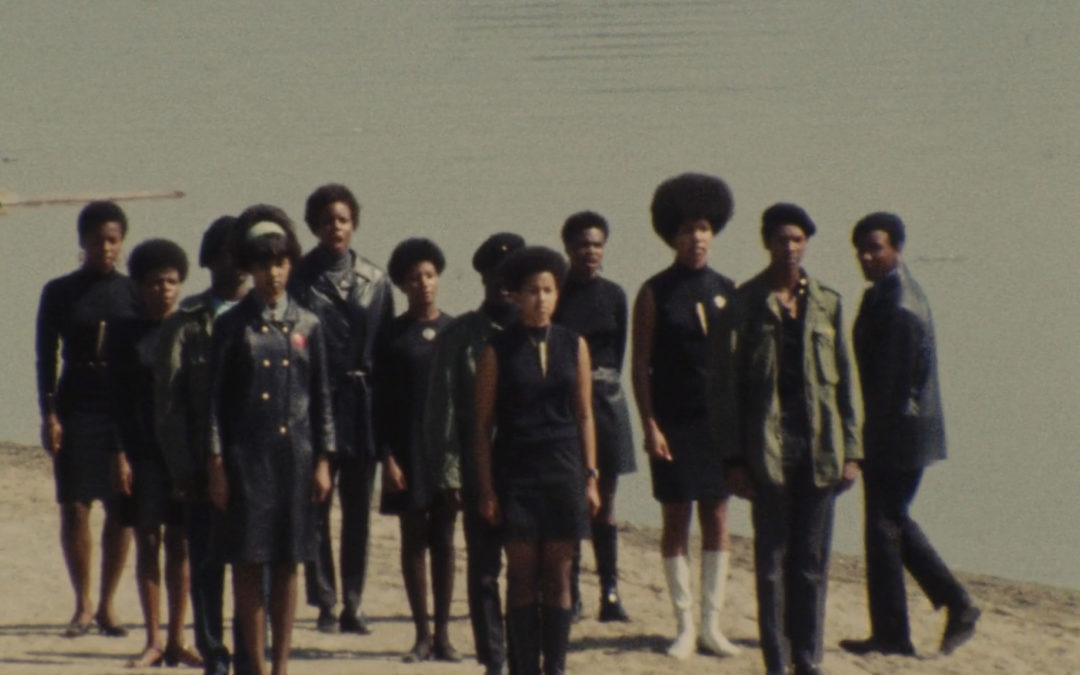
Recent Comments